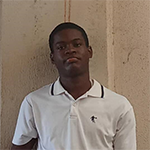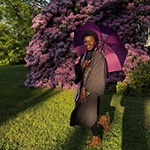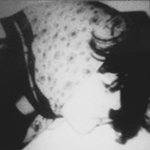erotomania
| I have pined nonstop for you | but only in the best of ways— | nerves fat with desire, so sinfully | rich my lungs make a run |
| away from me. I cradle a version | of you that burns me; I thirst after it, | I suffer over it; I surrender. | I am more want than want. I fold |
| into myself, take full gasps | when I see the heart- shaped sweat | on your chest, a sign so delicious | I reckon how perpetual your |
| hungering for me is. the way | you look at me, my God, | my head might eat itself. these | feral thoughts are doubling |
| beyond my control; they | tell me you have enough love | to leave me sated. I may just revel | in their afterglow, because love |
| as I know it is a rabid thing | that consumes one whole. | in the dream where you run | in my direction I let an army of |
| my softest bones lie at your feet; | I offer them to you | like orphans waiting to be blessed. one of | the languages I hold beneath |
| my skin stirs, takes the form of | an ache stretching, cancering, clawing out | my insides, leaping beside me. who | am I to ignore the teeth of it? |
for several months I tried to write a poem
about the man I thought I was in love with, how he came to me one complete morning, his hands gifting
his body, his eyes saturated with hope like they were begging me to feast, the poem hadn’t come, it wasn’t winter
yet, no black ice on the sidewalks, the birds still perched on the wires, waiting for a reason to leave,
when he held out his hands, they turned into a vortex that swallowed me, I allowed myself to be swallowed
because anything was better than being awake in my own body, because I hated my previous life, he kissed me
under a sky so vast it looked like it was lying, his other head wouldn’t stop nodding like hell until I took it
in my palms to pat it quiet, so I looked up to find his voice deep down my own throat, so I waited
for his voice to leave, but instead it remained, like it belonged there, sometimes he would reach for it,
he would swing his arms in the manner that showed he was making a demand, his ruffled hair on my cheeks,
our heartbeats lying feebly on the floor, for a minute I believed he was it, a man, an intention, the soft light
pouring across my face, I tell myself I could try to love him until I must, or I could lose him in the end
like the others, soon, the poem began to gather itself in my stomach, it strapped itself to my legs
when I was sure it was time to get out, of course I adored the poem, the way it collapsed itself inside me
like the man’s voice, asking me, in the absence of love or loss, what else is there to occupy you?

Ernest Ohia is a queer Nigerian poet and editor, currently pursuing an MFA in poetry at the University of Alabama, where he also serves as Design Editor for Black Warrior Review. His chapbook manuscript, The Wanting Flesh, was a finalist for the 2025 Garden Party Collective Chapbook Contest. He is the winner of the 2025 Sita Martin Prize in Poetry. An alumnus of the Tin House Summer Workshop, his work has appeared or is forthcoming in Lolwe, 20:35 Africa, Agbowo, Rigorous, Sho poetry journal, Ex-Puritan, and elsewhere.

 BACK TO ISSUE
BACK TO ISSUE







